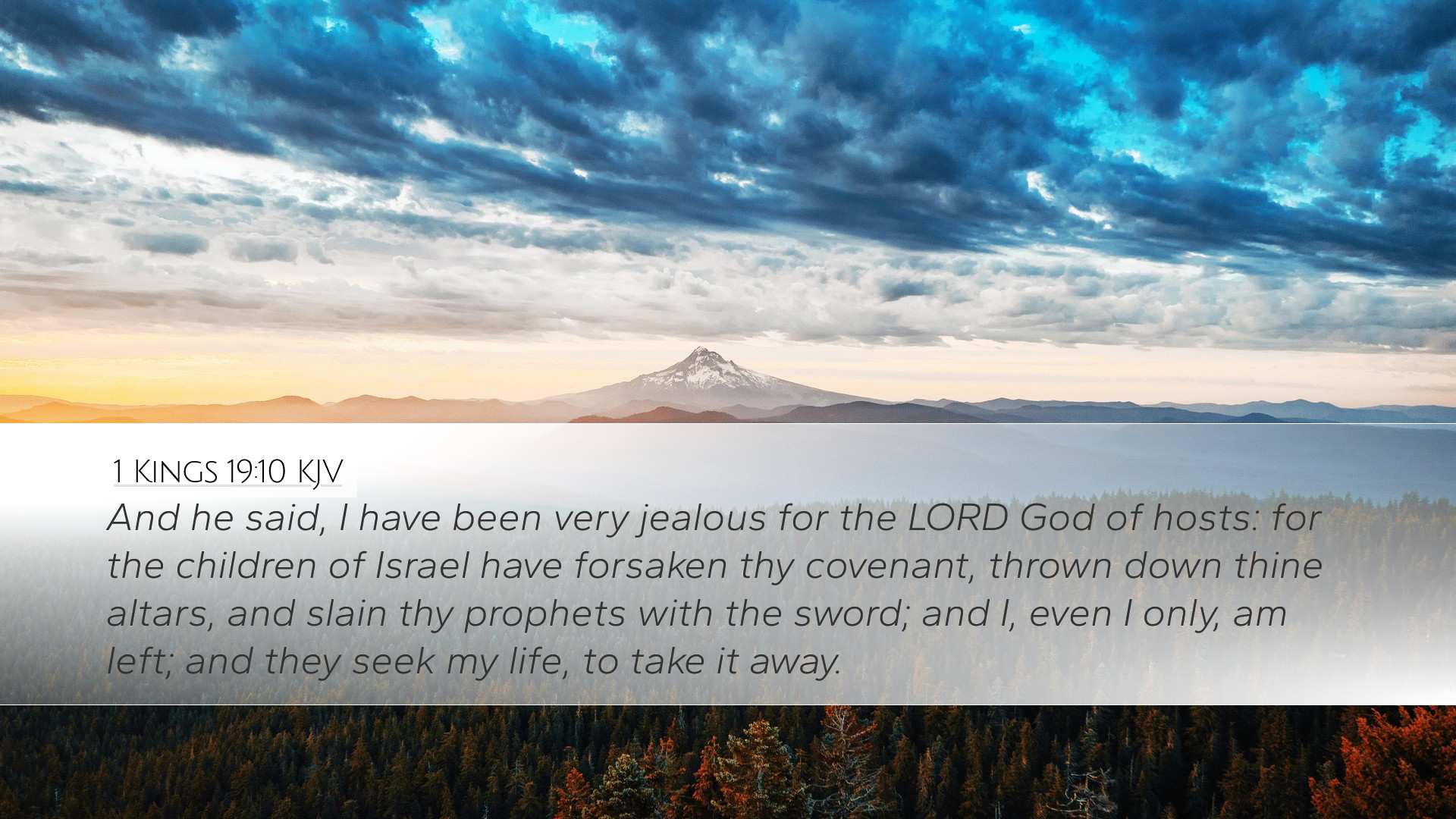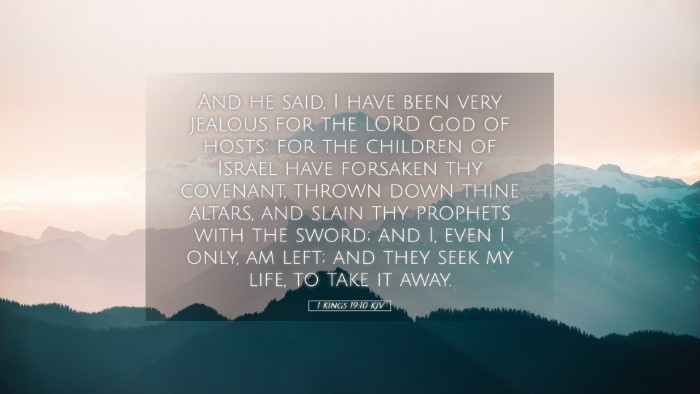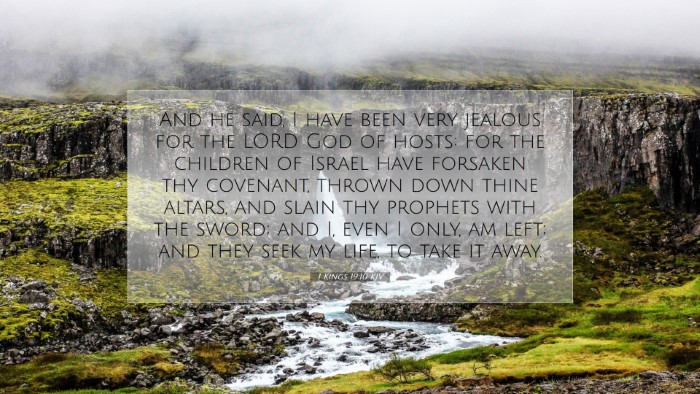Old Testament
Genesis Exodus Leviticus Numbers Deuteronomy Joshua Judges Ruth 1 Samuel 2 Samuel 1 Kings 2 Kings 1 Chronicles 2 Chronicles Ezra Nehemiah Esther Job Psalms Proverbs Ecclesiastes Song of Solomon Isaiah Jeremiah Lamentations Ezekiel Daniel Hosea Joel Amos Obadiah Jonah Micah Nahum Habakkuk Zephaniah Haggai Zechariah Malachi1 Kings 19:10
1 Kings 19:10 KJV
And he said, I have been very jealous for the LORD God of hosts: for the children of Israel have forsaken thy covenant, thrown down thine altars, and slain thy prophets with the sword; and I, even I only, am left; and they seek my life, to take it away.
1 Kings 19:10 Bible Commentary
Commentary on 1 Kings 19:10
Verse (1 Kings 19:10): “And he said, I have been very jealous for the Lord God of hosts: for the children of Israel have forsaken thy covenant, thrown down thine altars, and slain thy prophets with the sword; and I, even I only, am left; and they seek my life, to take it away.”
Contextual Background
In the preceding chapters, we witness the prophet Elijah confronting the apostasy of Israel. Under King Ahab and Queen Jezebel, Israel has turned away from Yahweh to bow down to Baal. This verse comes after Elijah’s confrontation with the prophets of Baal on Mount Carmel, where he manifested the power of God and called down fire from heaven. Following this victorious moment, Elijah receives a death threat from Jezebel, leading him into despair and flight to Mount Horeb.
Theological Insights
This verse encapsulates Elijah's profound sense of isolation and desperation. He expresses jealousy for God's honor—a commendable emotion, yet one that reveals the burden he carries for Israel's unfaithfulness. The term “jealous” denotes passionate commitment and protectiveness. Yet, it also arises from a painful realization of widespread apostasy and personal persecution.
1. Elijah’s Jealousy
Elijah’s declaration, “I have been very jealous for the Lord God of hosts,” reveals his passionate commitment to God’s covenant, highlighting a significant aspect of his prophetic ministry. This zeal is reminiscent of other biblical figures, such as Phinehas (Numbers 25:11) and Jesus (John 2:17), who displayed righteous anger for God's glory.
2. The Forsaking of God's Covenant
Elijah poignantly notes that the children of Israel have “forsaken thy covenant.” This forsaking implies a rejection of the sacred relationship God established with Israel, leading to devastating spiritual consequences. The severing of this covenant relationship illustrates a broader theme in Scripture: the consequences of disobedience and idolatry. Albert Barnes emphasizes that this rebellion is not just a personal failing but a national crisis that requires divine intervention.
3. The Destruction of Altars and Prophets
Elijah further laments that they have “thrown down thine altars” and “slain thy prophets.” These actions are indicative of a need to erase the worship of Yahweh and reflect a deep-seated antagonism toward God's messengers. Adam Clarke notes that while idol worship proliferated, the faithful remnants faced violence and suppression. This demonstrates the peril faced by those who uphold the truth amidst overwhelming opposition.
4. A Sense of Isolation
The statement “I, even I only, am left” captures Elijah’s profound isolation. He feels abandoned and alone in his faith. This sentiment resonates with many believers throughout history who face persecution or societal indifference. Matthew Henry remarks that God’s messengers often feel isolated when surrounded by apostasy, framing Elijah’s experience as a familiar struggle for those committed to following God amidst a culture of disbelief.
5. The Threat to Elijah’s Life
Lastly, Elijah expresses, “they seek my life, to take it away.” This highlights the personal danger he faces as a faithful prophet. It underscores the cost of commitment to God’s call and messages. McLaren suggests that this fear is rooted in Elijah's humanity and vulnerability, reminding readers that even the most faithful servants of God experience fear and doubt.
Practical Applications
This verse holds valuable lessons for contemporary believers, especially those in leadership. Here are several applications drawn from the hardships Elijah faced:
- Faithfulness in Adversity: Elijah’s story encourages leaders to remain faithful even when the odds seem insurmountable. The call to serve God may lead to perilous situations, but steadfastness is rewarded by God’s presence.
- The Importance of Community: Elijah’s sense of isolation serves as a reminder of the need for community among believers. Fellowship and mutual support are crucial for endurance in the faith journey.
- Addressing Apostasy: It challenges leaders to confront sin and seek genuine repentance in their communities. Like Elijah, they must uphold God’s standards courageously.
- Compassion for the Struggling: Understanding the weight of Elijah’s despair encourages pastoral care for those feeling overwhelmed by their circumstances, offering grace and support.
Conclusion
1 Kings 19:10 serves as a poignant reminder of the challenges faced by those who seek to live righteously in a world that pushes against divine truth. Elijah’s emotional and spiritual turmoil highlights core aspects of covenant relationship, communal struggle, and individual faithfulness. By reflecting on Elijah’s experiences, pastors, students, and scholars can glean significant insights into their personal walks with God and their mission within the church and society at large.


